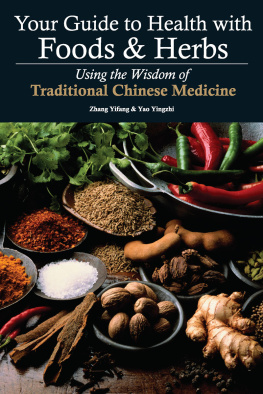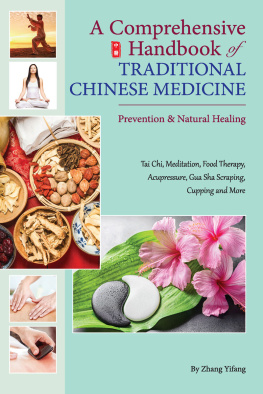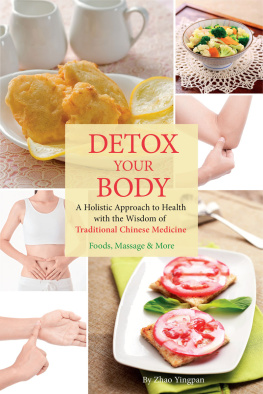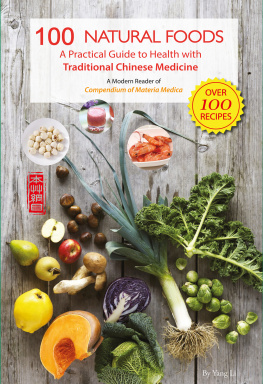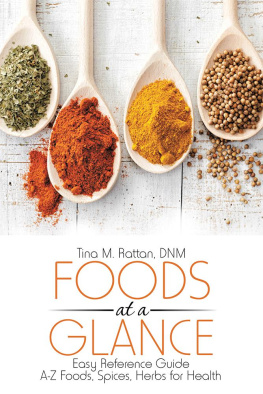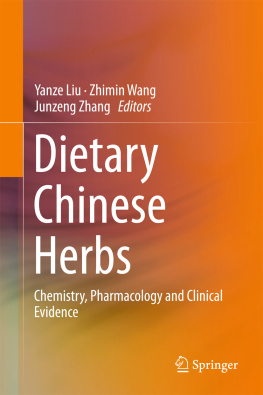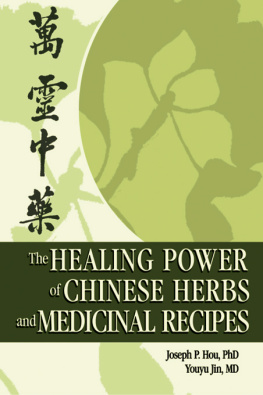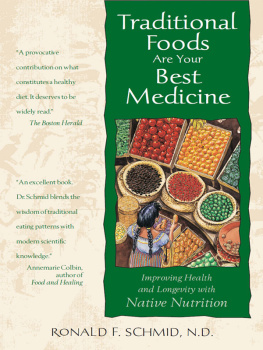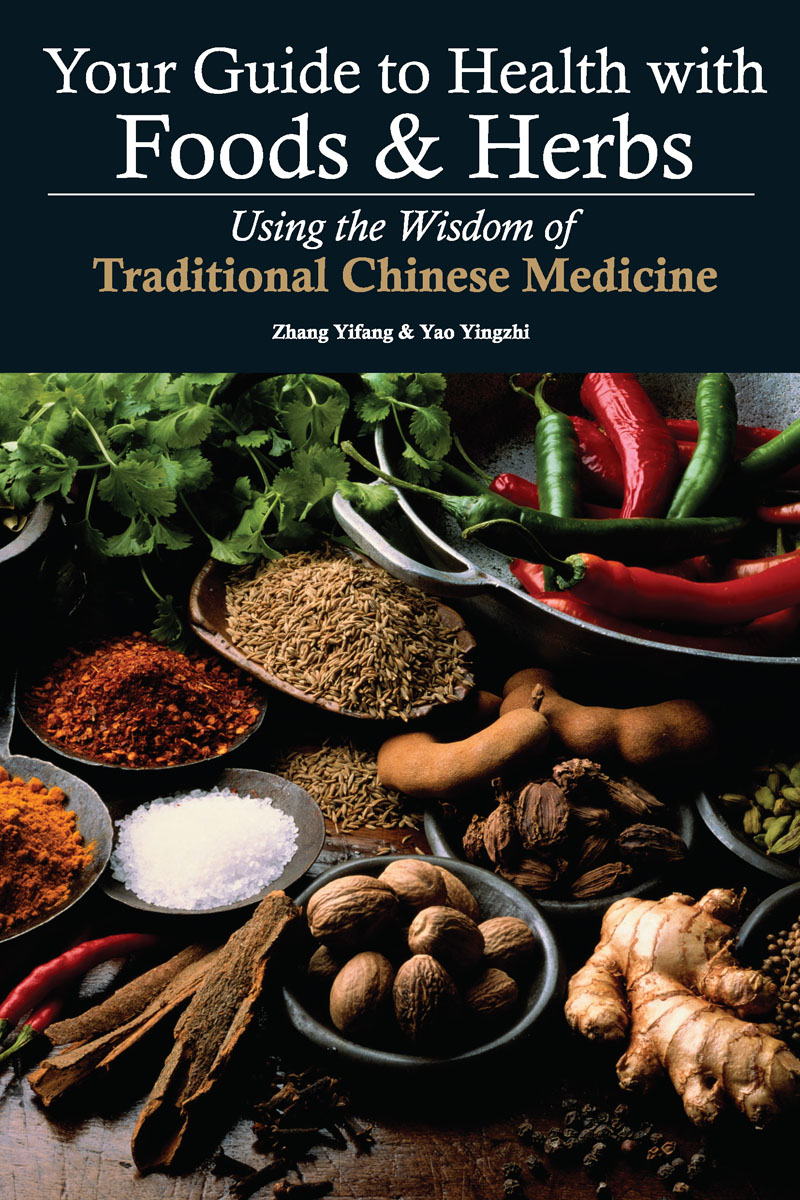

Copyright 2012 Shanghai Press and Publishing Development Co., Ltd.
All rights reserved. Unauthorized reproduction, in any manner, is prohibited.
This book is edited and designed by the Editorial Committee of Cultural China series.
Text: Zhang Yifang, Yao Yingzhi
Photographs: Roger Yan, Zhang Yifang, Yao Yingzhi, Roy Upton, Alfred Kump, Quanjing, Ding Guoxing
Cover Image: Quanjing
Cover and Interior Design: Wang Wei
Copy Editor: Kirstin Mattson
Editor: Yang Xiaohe
Editorial Director: Zhang Yicong
Senior Consultants: Sun Yong, Wu Ying, Yang Xinci
Managing Director and Publisher: Wang Youbu
ISBN: 978-1-60220-121-7
Address any comments about Your Guide to Health with Foods & Herbs: Using the Wisdom of Traditional Chinese Medicine to:
Better Link Press
99 Park Ave
New York, NY 10016
USA
or
Shanghai Press and Publishing Development Co., Ltd.
F 7 Donghu Road, Shanghai, China (200031)
Email:
Printed in China by Shenzhen Donnelley Printing Co., Ltd.
7 9 10 8
Contents
Foreword
T raditional Chinese medicine is one of the oldest systems of healing on earth. Its power to heal lies in ancient knowledge that recognizes that human health arises from a connection to earth through ones diet, lifestyle, exercise, healing traditions and relationship to creation. The medicine plants used in Chinese as well as other traditional systems of healing connect us with this ancient knowledge and provide us with a direct link to the healing spirit of earth. Many of the botanicals originally used in Chinese medicine have now found their way into healing traditions worldwide as Chinese medical philosophy has spread. This is in recognition of the unique contribution it can make to the healing of those suffering in ways not addressed in Western approaches to health care.
This text by Drs. Zhang Yifang and Yao Yingzhi, two authorities on Chinese herbal medicine, provides a valuable contribution to the herbal medicine literature by guiding us in how we can enhance the healing power of our diet by the combining of medicinal herbs with common foods. Using herbal medicines in this way has been a common practice in Chinese culture for centuries and is often overlooked in favor of the many teas, pills, tablets and other medicinal preparations that find their way into Chinese medical practice. The highest ideal of Chinese medicine throughout the centuries has been the cultivation of principles that help us stay well rather than waiting until something is wrong and then trying to fix it. I once was told of an ancient Chinese adage, to use herbs to treat sickness is like digging a well when you are thirsty. In other words, it is much better to incorporate medicinal plants in ones everyday life than waiting until it is too late.
This work provides unique guidance on how, on a daily basis, we can incorporate herbs into our lives to stay healthy as well as how to turn our common foods into profound medicines when we are sick. Anyone interested in the healing arts, regardless of the traditions they follow, can benefit from the experience and wisdom of these senior Chinese medical practitioners. Similarly, the knowledge and recipes contained herein can provide families with the guidance needed to bring healing practices directly into their homes in the most basic and profound way through daily nourishment. The authors are commended for sharing and expanding the knowledge of this part of Chinese healing traditions to a larger part of the world.
Roy Upton, RH, DAyu
President, Editor
American Herbal Pharmacopoeia
Preface
F inding a way to maintain a positive spirit and a healthy lifestyle has become an increasingly important focus these days. Traditional Chinese medicine (TCM), which has been relied upon by millions of people over the generations, provides simple yet effective ways to achieve optimal health through natural solutions and plant remedies. TCM can help you understand the many components that make you uniquely you! This book will enable you put that wisdom to use, providing practical information, case studies, treatment details, recipes and illustrations.
The functional food and herbs catalogued in this book are widely available, and combine a pleasing flavor with useful medical functions. To help you find the foods that are suited to your body and lifestyle, we provide a unique self-assessment so you can learn about your individual body constitution. This, combined with remedies for common illnesses, will put you on the path to better health.
Food is a part of everyday life, so much so that you may not give it a great deal of thought. Food offers an incredible ability to heal and nourish the human body. Different foods and herbs can act like medicine in their positive effects and help sustain a healthy state over time. Since they can produce a wide range of results, and at times even harmful effects, foods should be considered and chosen carefully so as to lead to greater well-being. This attitude toward the multitude of properties that food has, and the wealth of its effects, is at the core of Chinese Medicine.
Choosing the right food is essential to getting healthy and staying that way. In making wise choices, it is important to note that some foods may be better suited to a certain person or condition than to another. We are all different, physiologically and psychologically, and foods and herbs have individualized inherent qualities as well; so we need to understand the characteristics of ourselves and our foods when making choices.
Why did I choose to focus on this topic in writing this book?
Just as the old saying goes, an ounce of prevention is worth a pound of cure. The preventative side of TCM provides an appealing and accessible point of entry to anyone who wants to learn about and use Chinese medicine. Food therapy is the easiest way to start.
Using plants for health and the prevention of illness is deeply ingrained in Chinas rich culture. It is an important part of my personal experience as well. My brother and I grew up in a family steeped in Chinese medical tradition; with our parents and grandparents, simple yet effective food therapy was paramount in our daily life.
When my brother and I were young, if we experienced a bout of diarrhea, our mother always told us to drink wu mai tea (dried dark plums boiled with brown sugar). After only one or two drinks, we would recover. As a child facing exams, I would often be nervous and unable to sleep, so my father would bring me a cup of chrysanthemum tea or some peanuts. After that, I could sleep soundly.
Those memories of simple food-based remedies stuck with me as I grew older and learned the value of the phrase, yao bu bu ru shi bu, shi bu bu ru shen bu (, ), meaning that pharmaceutical remedies cannot compete with food remedies, which have compounded psychological effects that surpass their basic nutrient properties. Shen bu or psychological effects can be thought of as ones attitude toward overall wellness and total health maintenance, sometimes called the Health Quotient (HQ). By this belief, whenever doctors of Chinese medicine see a conflict between the patients body, environment, certain foods, and/or climate, they do not immediately look for a prescriptive remedy. Instead, they first seek to discover the root of the conflict. Then they take steps to avoid a continuation of this conflict. Finally, they use food therapy to eliminate the conflict and balance the body.
Next page
